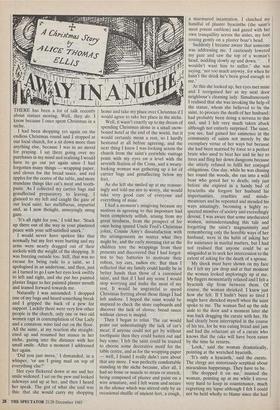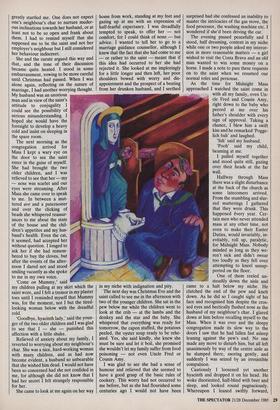THERE has been a lot of talk recently about statues
moving. Well, they do. I. know because I once spent Christmas in a niche.
I had been shopping yet again on the endless Christmas round and I stopped at our local church, for a sit down more than anything else, because I was in no mood for praying. I sat there going over my purchases in my mind and realising I would have to go out yet again since I had forgotten many things — wrapping paper, and cloves for the bread sauce, and red apples for the centre of the table, and more mundane things like cat's meat and tooth- paste. As I collected my carrier bags and genuflected preparatory to leaving, I glanced to my left and caught the gaze of our local saint: her mellifluous, impartial and, as I now thought, annoyingly smug gaze.
`It's all right for you,' I told her. 'Stuck up there out of the way in your plastered peace with your self-satisfied smirk.'
I would never have spoken like that normally but my feet were hurting and my arms were nearly dragged out of their sockets with the weight of the shopping. It was freezing outside too. Still, that was no excuse for being rude to a saint, so I apologised in an undertone, and then, just as I turned to go I saw her eyes look swiftly to left and right, and she put her painted plaster finger to her painted plaster mouth and leaned forward towards me.
Naturally I was astounded. 'I dropped one of my bags and heard something break and I gripped the back of a pew for support. Luckily there were very few other people in the church, only one or two old women rapt in contemplation of Our Lady and a comatose wino laid out on the floor. All the same, at my reaction she straight- ened up and resumed her stance in her niche, gazing into the distance with her small smile. After a moment I addressed her again.
`Did you just move,' I demanded, in a whisper, 'or am I going mad on top of everything else?'
Her eyes flickered down at me and her smile widened. I sat on the pew and looked sideways and up at her, and then I heard her speak. The gist of what she said was this: that she would carry my shopping home and take my place over Christmas if I would agree to take her place in the niche.
Well, it wasn't exactly up to my dream of spending Christmas alone in a small snow- bound hotel at the end of the world, but it would certainly mean a rest, so I hardly hesitated at all before agreeing; and the next thing I knew I was looking across the church from the saint's erstwhile vantage point with my eyes on a level with the seventh Station of the Cross, and a weary- looking woman was gathering up a lot of carrier bags and genuflecting below my feet.
As she left she smiled up at me reassur- ingly and told me not to worry, she would take very good care of everyone and everything of mine.
I had a moment's misgiving because my motives in agreeing to this imposture had been completely selfish, arising from my great tiredness, from the prospect of for once being spared Uncle Fred's Christmas jokes, Cousin Amy's dissatisfaction with the arrangements no matter what they might be, and the early morning riot as the children tore the wrappings from their presents and discovered that I had forgot- ten to buy batteries to motivate their robots, toy cars, radios etc. But then I reflected that my family could hardly be in better hands than those of a canonised saint; and that if I had any sense I would stop worrying and make the most of my rest. It would be ungrateful to spend Christmas fretting about those things I had left undone. I hoped the saint would be inspired to check the store cupboards and discover the lack of cloves; bread sauce without cloves is insipid.
Then I began to relax. The cat would point out unhesitatingly the lack of cat's meat; if anyone could not get by without toothpaste then they could hasten out and buy some. I felt the saint could be trusted to choose some decorative motif for the table centre, and as for the wrapping-paper — well, I found I really didn't care about that any more. I was perfectly comfortable standing in the niche because, after all, I had no bone or muscle to strain or stretch, being composed of plaster and paint on a wire armature, and I felt warm and secure in the silence which was stirred only by an occasional shuffle of ancient feet, a cough, a murmured incantation. I clutched my handful of plaster hyacinths (the saint's most potent emblem) and gazed with her own tranquillity across the aisles, my foot resting gently on a plaster boar's head.
Suddenly I became aware that someone was addressing me. I cautiously lowered my gaze and saw the top of a woman's head, nodding slowly up and down. `. . . I wouldn't want him to suffer,' she was saying; 'not too much anyway, for when he hasn't the drink he's been good enough to me.'
At this she looked up, her eyes met mine and I recognised her as my next door neighbour's cleaning lady. Simultaneously I realised that she was invoking the help of the statue, whom she believed to be the saint, to procure the death of her husband; had probably been doing a novena to this end, and I felt very much taken aback although not entirely surprised. The saint, you see, had gained her eminence in the community of saints not merely by the exemplary virtue of her ways but because she had been married by force to a perfect brute who used to beat her and tie her to trees and fling her down dungeons because she utterly refused to fulfil her conjugal obligations. One day, while he was chasing her round the woods, she ran into a wild boar who gored her to death; only just before she expired in a handy bed of hyacinths she forgave her husband his importunities, cruelties and misde- meanours and he repented and mended his ways amazingly, becoming a highly re- spected member of society and exceedingly devout. I was aware that some uneducated women, misunderstanding this tale and forgetting the saint's magnanimity and remembering only the horrible ways of her husband, were in the habit of asking her for assistance in marital matters, but I had not realised that anyone could be so misguided as to seek her intercession to the extent of asking for the death of a spouse.
My shock must have shown on my face for I felt my jaw drop and at that moment the woman looked imploringly up at me. My fingers momentarily relaxed and I felt a hyacinth slip from between them. Of course, the woman shrieked. I knew just how she felt. If I hadn't been so tired I might have shrieked myself when the saint spoke to me. The woman fled up the side aisle to the door and a moment later she was back dragging the curate with her. He had clearly been interrupted in the course of his tea, for he was eating bread and jam and had the reluctant air of a curate who knows that the cake will have been eaten by the time he returns.
`Look,' said the woman dramatically, pointing at the wretched hyacinth.
`It's only a hyacinth,' said the curate. The clergy are notoriously sceptical about miraculous happenings. They have to be.
`She dropped it on me,' insisted the woman, pointing up at me while I strove very hard to keep in countenance, much regretting my lapse although I felt I could not be held wholly to blame since she had greatly startled me. One does not expect one's neighbour's char to nurture muder- ous inclinations towards her husband, or at least not to be so open and frank about them. I had to remind myself that she supposed me to be the saint and not her employer's neighbour but I still considered her behaviour indiscreet.
The next morning as the congregation arrived for Mass I kept a wary eye on the door to see the saint enter in the guise of myself. She had brought the two older children, and I was relieved to see that her — my — nose was scarlet and our eyes were streaming. After Mass she came over to speak to me. In between a mut- tered ave and a paternoster and over the clicking of beads she whispered reassur- ances to me about the state of the house and the chil- dren's appetites and my hus- band's health. Even the cat, it seemed, had accepted her without question. I longed to ask her if she had remem- bered to buy the cloves, but after the events of the after- noon I dared not and stood smiling vacantly as she spoke to me in my own voice.
`Come on Mummy,' said my children pulling at my skirt which the saint wore, and I felt a tremor in my plaster toes until I reminded myself that Mummy was, for the moment, not I but the tired- looking woman below with the dreadful cold.
`Goodbye, hyacinth lady,' said the youn- ger of the two older children and I was glad to see that I — she — punished this affection with a little shake.
Relieved of anxiety about my family, I reverted to worrying about my neighbour's char. She was a nice, hard-working woman with many children, and as had now become evident, a husband so unbearable that she wished him dead. I would not have been so concerned had she not confided in me, for although she did not know that I had her secret I felt strangely responsible for her.
She came to look at me again on her way home from work, standing at my feet and gazing up at me with an expression of half-fearful expectancy. I was dreadfully tempted to speak, to offer her — not comfort, for I could think of none — but advice. I wanted to tell her to go to a marriage guidance counsellor, although I knew that the fact that she had come to me — or rather to the saint — meant that if this idea had occurred to her she had rejected it. She looked at me imploringly for a little longer and then left, her poor shoulders bowed with worry and dis- appointment and the prospect of a beating from her drunken husband, and I seethed in my niche with indignation and pity.
The next day was Christmas Eve and the saint called to see me in the afternoon with two of the younger children. She sat in the pew below me while the children went to look at the crib — at the lambs and the donkey and the star and the baby. She whispered that everything was ready for tomorrow, the capon stuffed, the potatoes peeled, the oyster soup ready to be rehe- ated. Yes, she said kindly, she knew she must be sure and let it boil, she promised she wouldn't let my family suffer from food poisoning — not even Uncle Fred or Cousin Amy.
I was glad to see she had a sense of humour and relieved that she seemed to have a good grasp of the basic rules of cookery. This worry had not occurred to me before, but as she had flourished some centuries ago I would hot have been surprised had she confessed an inability to master the intricacies of the gas stove, the food processor, the washing machine etc. I wondered if she'd been driving the car.
The evening passed peacefully and I stood, half dreaming, content in my niche while one or two people asked my interce- sion in more reasonable matters — a girl wished to visit the Costa Brava and an old man wanted to win some money on a horse. I made a note to pass these requests on to the saint when we resumed our normal roles and personae.
As the time for Midnight Mass approached I watched the saint come in with all my family, even Un- cle Fred and Cousin Amy, right down to the baby who peered at me over his father's shoulder with every sign of approval. Taking a chance, I blew him a swift kiss and he remarked 'Pogge- lich bah' and laughed.
`Ssh' said my husband. `Pooh' said my child, beaming at me.
I pulled myself together and stood quite still, gazing over their heads at the far wall.
Halfway through Mass there was a slight disturbance at the back of the church as some latecomers arrived. From the stumbling and slur- red mutterings I gathered that they were drunk. This happened every year. Cer- tain men who never attended mass at any other time, not even to make their Easter Duties, would invariably, in- evitably, roll up, paralytic, for Midnight Mass. Nobody minded as long as they we- ren't sick and didn't swear too loudly as they fell over attempting to kneel unsup- ported on the floor.
One of them reeled un- steadily down the aisle and came to a halt below my niche. He clutched the end of the pew and knelt down. As he did so I caught sight of his face and recognised him despite the cros- sed eyes and hectically flushed nose as the husband of my neighbour's char. I glared down at him before recalling myself to the Mass. When it was over and the sleepy congregation made its slow way to the doors I saw that he had fallen fast asleep leaning against the pew's end. No one made any move to disturb him, but all left unanimously by way of the centre aisle as he slumped there, snoring gently, and suddenly I was seized by an irresistible compulsion.
Cautiously I loosened yet another hyacinth and dropped it on his head. He woke disoriented, half-blind with beer and sleep, and looked round pugnaciously. Whereupon I leaned swiftly forward, seized him by the collar so that he was forced to look into my face, and remarked in a low but positive tone, 'If you don't stop drinking and beating your wife, you bastard, you will be very, very sorry.' Then I dropped him and stood back in the niche, stone-still and silent.
I heard later that he had left the church, gone home and kissed his wife and all his children, thrown away the cans of beer he was keeping in the sideboard, helped wash up after Christmas dinner and taken his whole family for an outing on Boxing Day. His wife never knew exactly what had happened but she was delighted. When he stopped drinking he was able to go back to being a builder's labourer and he made so much money that she was able to give up her job cleaning for my neighbour and stay at home washing his labouring clothes. My neighbour was very put out but I felt that that really couldn't be helped.
The saint came back the day after Boxing Day. I thought that she — I looked very tired, but she seemed content and said that she had left everything as she imagined I would wish to find it and Cousin Amy had not been too obnoxious. There were quite a few left-overs still, but she was sure I would be able to sort everything out when I got home. She apologised that the bread sauce had been a bit tasteless be- cause she hadn't been able to find any cloves but everything else had been very good. When she was back in her niche and I in my self I thought that she looked rather relieved, and I was a bit annoyed to find that she had left me with the remains of her cold, although she had got over the initial worst stages of sore throat, raw chest and itching nose.
I found the house remarkably tidy with an unusual air of order and propriety; the children cheerful and amiable. Only the baby was sitting in his pram, thumb in mouth, looking puzzled and faintly forlorn. When I picked him up he looked at me for a long moment, then took his thumb out of his mouth, put his arms around my neck and would not be parted from me until he fell asleep long past his bedtime when the moon was high.
Alice Thomas Ellis's fifth novel, Unex- plained Laughter was published this au- tumn (Duckworth, f8.95).




















































































 Previous page
Previous page